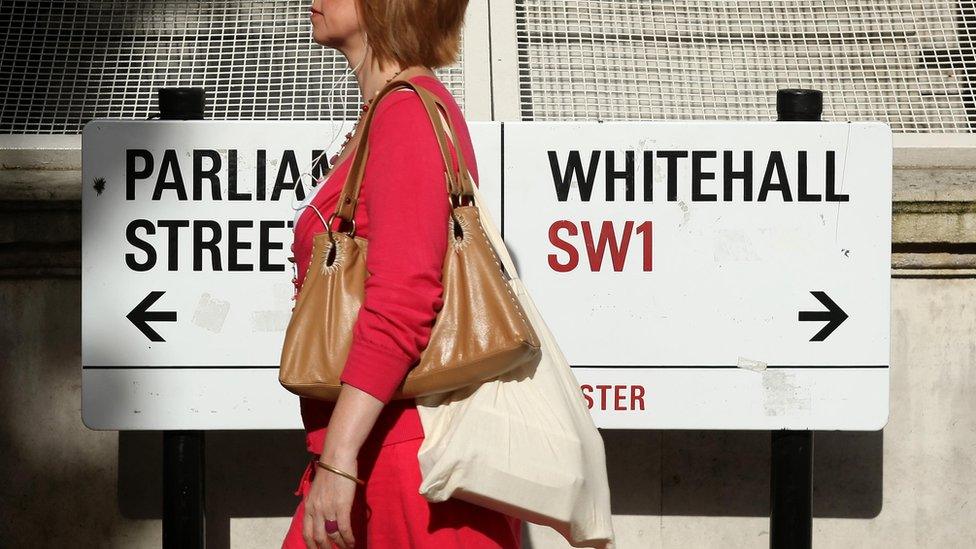Toughen up rules on ministers' conduct, says standards watchdog
- Published

The rules governing the conduct of ministers and senior civil servants need to be toughened up, according to a new report.
The Committee on Standards in Public Life - which advises the PM on ethical standards - has been carrying out a review into processes in Westminster.
It concluded transparency around lobbying was "poor" and the current guidance relied too much on convention.
The watchdog has recommended to Boris Johnson that rules be strengthened.
A Cabinet Office spokeswoman said the government would "carefully consider" the report.
The committee's review began in September last year - shortly before a row broke out over the publishing of a report into allegations of bullying against Home Secretary Priti Patel, and the Greensill lobbying scandal involving former Prime Minister David Cameron hit Westminster.
It released its interim findings in July, calling for more transparency around lobbying ministers and for improvements to the rules about when ministers can take up private sector roles after leaving government.
Releasing the report's full findings, the committee's chairman and former director of MI5, Lord Evans, said social media, political polarisation and what he described as the "coarsening of public debate" had increased the risks to public standards, along with additional pressure from the pandemic and Brexit.
He added: "High standards of conduct support our democracy, economy, and foreign policy.
"The UK's success in advocating against corruption abroad depends on its reputation for ethical conduct at home."
'Vigilance and leadership'
The report found the effectiveness of ethics regulators in Whitehall had "not kept pace with wider changes" and said there was a "particular need for reform in central government".
The committee recommended strengthening the restrictions and guidance on lobbying - particularly when carried out through informal channels.
And it called for more power to be given to the independent adviser on ministerial standards, which advises the PM on the rules governing his cabinet's conduct, the ministerial code.
Lord Evans also wanted to see that code include a list of possible sanctions the prime minister could impose on those who break it - including apologies, fines and asking for a resignation.
And he said he wanted these stronger rules to be written into law.
"The arrangements to uphold ethical standards in government have come under close scrutiny and significant criticism in recent months," said Lord Evans. "Maintaining high standards requires vigilance and leadership.
"We believe our recommendations outline a necessary programme of reform to restore public confidence in the regulation of ethical standards in government."

Lord Evans was appointed Chair of the Committee on Standards in Public life in October 2018
The report was welcomed by Labour, whose deputy leader Angela Rayner accused Mr Johnson and the Conservative Party of "repeatedly undermining standards in our public life".
She added: "The system that is supposed to uphold the ministerial code, lobbying rules, business appointments, public appointments and transparency is clearly unfit for purpose.
"Ministers have disregarded the rules and it is about time for a radical overhaul of the system."
Campaign organisation Transparency International UK also welcomed the report and said the recommendations should be implemented in full.
Chief executive Daniel Bruce said: "It is incumbent on the PM to enact these significant but sensible reforms without delay.
"Failing to do so would constitute a deliberate choice to leave the door wide open to abuses of public office for private gain."